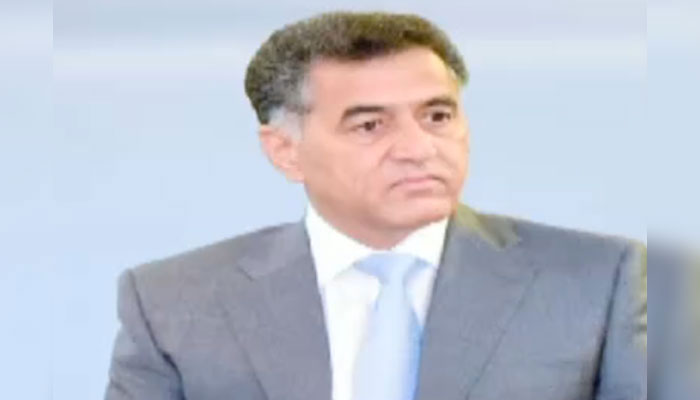Faiz Hamid charge-sheet
ISPR confirms FGCM process was initiated on August 12 under Pakistan Army Act
Former Inter-Services Intelligence (ISI) chief Lieutenant General (r) Faiz Hamid’s formal arraignment in the ongoing field general court-martial (FGCM) proceedings can safely be called a moment in history for Pakistan – especially when it comes to institutional accountability in the country. The Inter-Services Public Relations (ISPR) has confirmed that the FGCM process was initiated on August 12 under the Pakistan Army Act, and Gen (r) Faiz now faces charges of engaging in political activities, violating the Official Secrets Act, misuse of authority, and causing wrongful loss to individuals. Additionally, his alleged involvement in fomenting unrest, including events leading up to the May 9, 2023, incidents, is under separate investigation.
For a recap: Gen Faiz’s arrest in August stemmed from a Supreme Court petition filed by a housing society’s chief executive officer, accusing him of land grabbing and theft during a raid. However, his case has broader implications, with speculation rife about his involvement in political activities during his service and post-retirement, particularly in relation to the PTI and Imran Khan. Predictably, Imran had distanced himself from Gen Faiz after his arrest, asserting no connection with him. Now, the PTI’s Barrister Gohar has also called the chargesheet an internal military matter, seeking to distance the PTI from this whole situation. But, in keeping with the PTI’s fractures within, PTI leader Sher Afzal Marwat has said that Gen Faiz had not benefited the party – an internal discord within the PTI over its past associations with the former ISI chief may come to the fore even more?
The general consensus is that Gen Faiz’s arrest and trial should not be viewed in isolation, and analysts have been quick to point out that Imran Khan and the PTI were beneficiaries of the general’s schemes. The ISPR’s inclusion of the May 9 incidents in its charge-sheet underscores the gravity of the allegations. Should the trial substantiate claims by the PDM parties that there was an attempt to instigate action within the military, it could have far-reaching implications for Imran Khan and his party. Needless to say, all of this must of course come with the strictest of due process and with conclusive evidence to substantiate all claims. Perhaps the more important conversation this trial and these charges are leading to is about the need for robust institutional accountability. Gen Faiz’s tenure was marred by allegations of political meddling and misuse of authority and even after retirement, there were loud whispers regarding his involvement in political machinations. Such practices undermine the integrity of state institutions and set dangerous precedents for future officers. Accountability must be impartial and comprehensive, targeting all individuals who misuse their positions.
The Supreme Court Bar Association (SCBA) has welcomed the FGCM proceedings, describing them as a “significant step towards institutional introspection” and noting that this development challenges the notion of “sacred cows”. They are not wrong. This case should not be seen as just about one individual or one political party; it is rather a litmus test for Pakistan’s commitment to accountability and rule of law. Institutional integrity demands that no individual, regardless of rank or office, be allowed to act with impunity. The parth is clear: accountability across the board, devoid of favouritism or selective justice.
-
 Kanye West's Best Songs: Fans Argue Over Bold Top 10 Ranking On Social Media
Kanye West's Best Songs: Fans Argue Over Bold Top 10 Ranking On Social Media -
 King Charles Secretly Relies On Advice From THIS Royal
King Charles Secretly Relies On Advice From THIS Royal -
 Jennifer Garner Reveals Beauty Choice She Makes As Botox Alternative In Her 50s
Jennifer Garner Reveals Beauty Choice She Makes As Botox Alternative In Her 50s -
 Kate Middleton Drops Four-word Message For Young Girl After Wales Visit
Kate Middleton Drops Four-word Message For Young Girl After Wales Visit -
 Shamed Andrew Uncensored ‘massages’ Should Be Refunded To Public
Shamed Andrew Uncensored ‘massages’ Should Be Refunded To Public -
 Kylie Kelce Reveals Rules She Wants Daughter Bennett To Learn At 3: No More 'passies'
Kylie Kelce Reveals Rules She Wants Daughter Bennett To Learn At 3: No More 'passies' -
 Smartphone Market Set For Biggest-ever Decline In 2026
Smartphone Market Set For Biggest-ever Decline In 2026 -
 Mud, Rain, Loincloths: All About Japan’s 200-year-old Harvest Wrestling Ritual
Mud, Rain, Loincloths: All About Japan’s 200-year-old Harvest Wrestling Ritual -
 Jonathan Majors Set To Make Explosive Comeback To Acting After 2023 Conviction
Jonathan Majors Set To Make Explosive Comeback To Acting After 2023 Conviction -
 Next James Bond: Why Jacob Elordi May Never Get 007 Role?
Next James Bond: Why Jacob Elordi May Never Get 007 Role? -
 Maddox Drops Pitt From Surname In Credits Of Angelina Jolie’s New Film 'Couture' Despite Truce From Father's End In Legal Battle
Maddox Drops Pitt From Surname In Credits Of Angelina Jolie’s New Film 'Couture' Despite Truce From Father's End In Legal Battle -
 Meghan Markle Adds Diamonds To Engagement Ring For Jordan Trip
Meghan Markle Adds Diamonds To Engagement Ring For Jordan Trip -
 Burger King Launches AI Chatbot To Track Employee Politeness
Burger King Launches AI Chatbot To Track Employee Politeness -
 Andrew’s Woes Amid King Charles’ Cancer Battle Triggers Harry Into Action For ‘stiff Upper Lip’ Type Dad
Andrew’s Woes Amid King Charles’ Cancer Battle Triggers Harry Into Action For ‘stiff Upper Lip’ Type Dad -
 Experts Warn Andrew’s Legal Troubles In UK Could Be Far From Over
Experts Warn Andrew’s Legal Troubles In UK Could Be Far From Over -
 Teyana Taylor Reflects On Dreams Turning Into Reality Amid Major Score
Teyana Taylor Reflects On Dreams Turning Into Reality Amid Major Score




